617 Search Results for tell me about it
May 21, 2014
by Carole Zangari -
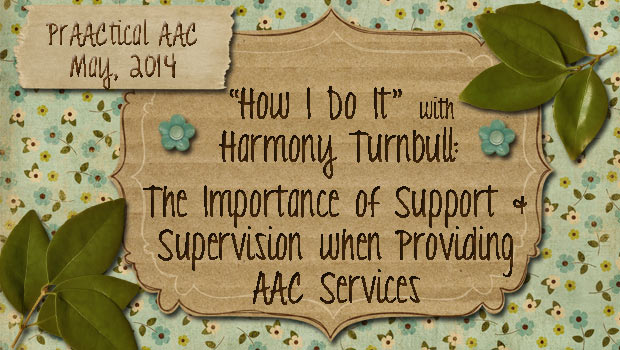
We are so thrilled to have a guest post today, from Australian SLP Harmony Turnbull. Harmony is a Consultant Speech Pathologist for Ageing, Disability and Home Care in NSW, Australia. In her role, she provides support and supervision to senior speech pathologists, carries a small caseload of people with complex needs and provides expert consultancy for management. She has specialised in supporting people with disabilities including complex communication needs for 11 years and is addicted to networking. She can often be found sharing her knowledge and asking many questions on Facebook and Twitter (@SP_Harmony). Harmony is passionate about the work speech/language pathologists can do to improve the quality of life for people with disabilities. The Importance of Support and Supervision when Providing AAC Services Scenario – Jane Jane is an SLP who has been working with people with disabilities for over 5 years, including people with complex communication needs. Her caseload... [Read More...]
May 19, 2014
by Carole Zangari -
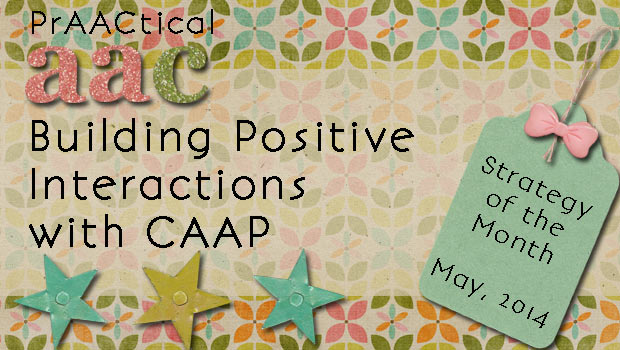
One of the challenges in helping AAC learners maximize their communicative potential is that they often interact with people who do not facilitate positive interactions. We know, for example, that partners may focus on the SGD rather than the topic or communicator (e.g., “Can you find ‘go?’, “Press it again”). They may dominate the conversation by taking more than their fair share of turns, making for a lop-sided and uninteresting context that is more of a monologue than a true conversation. They also tend to interrupt the AAC learner, often in an attempt to guess the learner’s message, save time, or correct the person. These actions come from a good place (wanting to support the learner) but are not things that facilitate improved communication. In a previous post, we talked about the RAAP strategy, for building partner skills during storybook reading. In this post, we continue to share the work of... [Read More...]
May 18, 2014
by Carole Zangari -
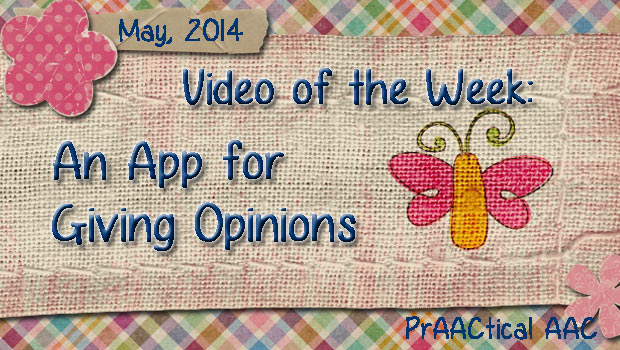
In previous posts, we’ve written about our love of rating scales as an easy way to help people with significant language challenges express their preferences. We also posted a video of that in action with a little preschooler using Talking Mats to tell whether he liked or disliked various school activities. What could be better than getting the authentic input from our prAACtical friends? Two things, actually. An e-tool for this purpose A FREE app In this post, we share two demonstrations, one with an adult client and one with a child. You can see the demo of the app here. First, take a look at James. https://www.youtube.com/watch?v=SzAgGmLYpE0 Next, let’s take a peek at Matthew: https://www.youtube.com/watch?v=GIIv17eTgFI And, last, but not least, a link to the free Talking Mats app.
May 16, 2014
by Carole Zangari -
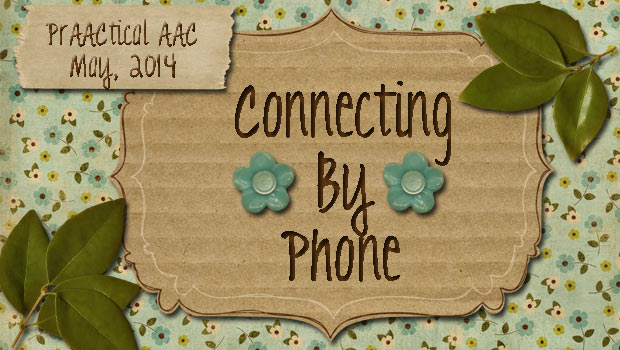
In the US, we just celebrated Mother’s Day and the phone lines were busy with people connecting with moms, grandmothers, aunts, and friends. In this short video, Jennifer Lindner, reminds us that not everyone has an easy time making a phone call. AAC is a great option for some, but others prefer to use their natural speech, even when there is diminished intelligibility. Everyone in the US with a significant speech impairment is eligible for a free service connecting speech impaired people with trained communication partners who can assist them in making phone calls. Speech-to-Speech is a nonprofit organization that has helped promote this concept and make it available throughout the country. Take a look. Direct Link to Video: https://www.youtube.com/watch?v=rKaK2cV8Km8
May 8, 2014
by Carole Zangari -
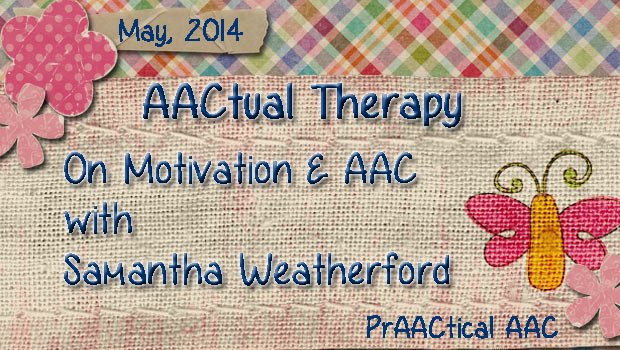
Motivating clients to use and learn more about their AAC systems can sometimes be a challenge, particularly if the learner has had decades of life experience before being introduced to AAC. In this post, we welcome SLP Samantha Weatherford, who works in the areas of early intervention and adult rehabilitation. She blogs at So To Speak regarding the educational, professional, and clinical processes of becoming an SLP. She resides in Delaware with her cat Simon, and took some time to share her thoughts about helping adult clients get motivated to use AAC. On Motivation and AAC Have you ever started the AAC training and trialing process with an adult client and realized, “This person is just not interested in being here or doing this?” Maybe it’s just me, but I feel like this happens quite often. I would never rule-out the possibility for AAC eligibility as a result of an... [Read More...]
May 5, 2014
by Carole Zangari -
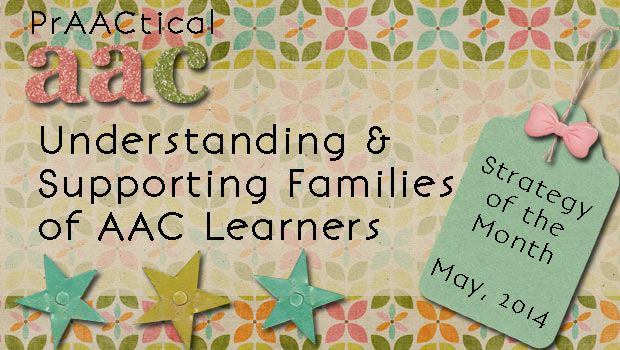
Let’s start with a basic premise: We can’t maximize AAC learning outcomes unless we’re working well with families. This is easier said than done, especially in some settings. As a clinician in a university clinic, for example, seeing families is the norm. We get to interact with them before and after the therapy. They get to observe or participate in the session. We can show them the data, observe how they interact with the AAC user in their family, and answer questions as they arise. And even with all of that, supporting them is challenging in that it takes time, skill, and planning. Although it is one of our favorite things to do, it’s not always easy to align our actions with our (stellar, ambitious) intentions. Multiply that by a factor of a zillion for our colleagues in schools and other settings where frequent, casual interactions are difficult to come... [Read More...]
April 17, 2014
by Carole Zangari -
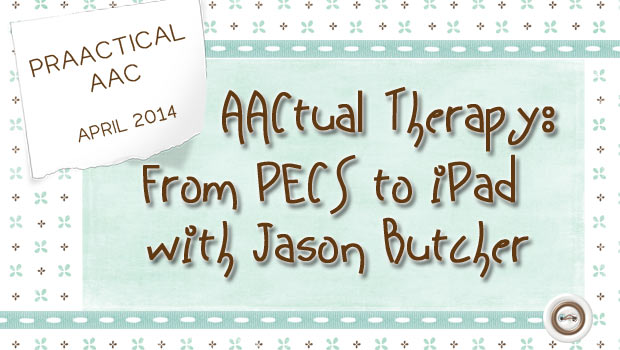
We are pleased to share a guest post by SLP Jason Butcher, who serves students at Grant County Middle School. Jason has been working with middle and high school students for the past 14 years. He earned his Master’s in Communication Disorders from the University of Kentucky in 1999. He admits that he came to do AAC more out of necessity than interest due to serving a huge variety and degree of speech/language impairments on his caseload. He has always enjoyed working with technology and is patient when fixing problems, qualities that he thinks have served him well when hitting the inevitable roadblocks that come with working in the area of AAC. In this post, Jason shares some candid thoughts on the transition from PECS to an iPad for a student with whom he works. It was nearing the end of September when I began to fear that Ms. Ruff, a teacher... [Read More...]
April 16, 2014
by Carole Zangari -
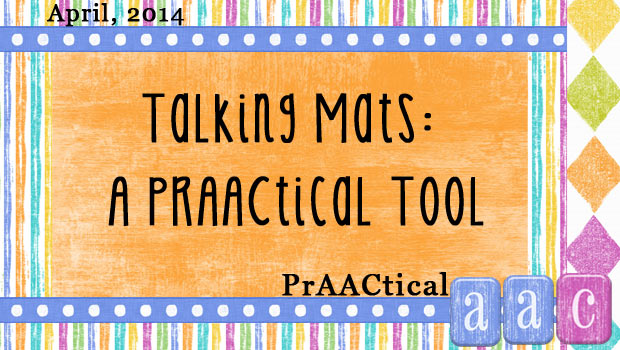
We’ve shared about Talking Mats in a video and on our Facebook page, but we needed to call on the experts to go into more detail about this approach. Thankfully, the co-directors of this project, Dr. Joan Murphy and Lois Cameron, were willing to collaborate. in this post, Dr. Murphy shares her knowledge with us. Hope you enjoy learning about the implementation of Talking Mats as much as we did. What is Talking Mats? Talking Mats is an innovative, award-winning communication tool which is based on extensive research and designed by Speech and Language Therapists in Scotland. Our vision is to improve the lives of people with communication difficulties by increasing their capacity to express their views about things that matter to them. Talking Mats is an interactive resource that uses three sets of picture symbols – top scale, topics and options and a space on which to display them.... [Read More...]
April 10, 2014
by Carole Zangari -
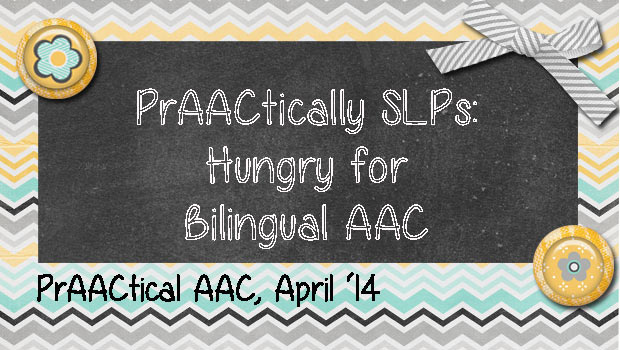
We are so excited to launch, PrAACtically SLPs, a new series featuring the voices of graduate students in SLP programs who do outstanding work in AAC. We start off with a wonderful group from the University of North Carolina at Chapel Hill. Allie Rodriguez, Caitlin Rich, and Megan Latta are second year SLP students who will be graduating in May. They recently concluded an AAC course taught by Dr. Penny Hatch, who continues to mentor them in the field of AAC and literacy. I met these energetic young professionals at the North Carolina Augmentative Communication Association Conference in February and was inspired by their passion. In this post, they tell us about their AAC experiences on a trip to Guatemala. Hungry for Bilingual AAC? Today, our population is becoming more culturally diverse, which, in turn, has caused our caseloads to reflect this change. There is a growing... [Read More...]
March 26, 2014
by Carole Zangari -
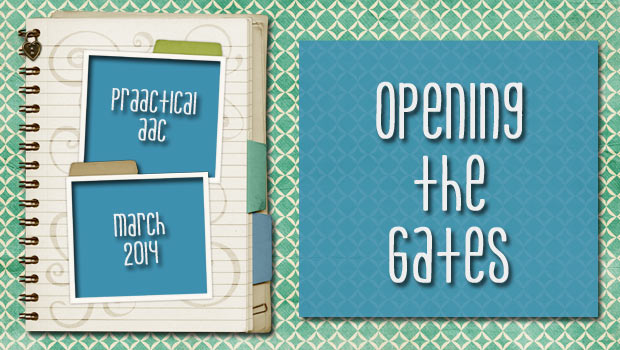
For many users of AAC, the road to communicative competence is an arduous one. Consider the case of JJ, a bright 4 year old with severe motor limitations, who enters a typical preschool with only a few intelligible words. After months of meetings, on the first day of school, his proud parents carry him into the classroom. They fasten him into an adapted chair that they brought for him to sit in and spend a half hour giving his aide instructions about his likes and dislikes, feeding difficulties, and toileting needs. Meanwhile, his teacher introduces him to some classmates, who are amazed, curious, and a little frightened of his unusual chair, constant drooling, grunting sounds, and random, jerky movements. One brave soul offers the child a toy, but JJ’s unruly arms bat it away and won’t let him take it. His would-be friend steps back, a bit confused. As they... [Read More...]









